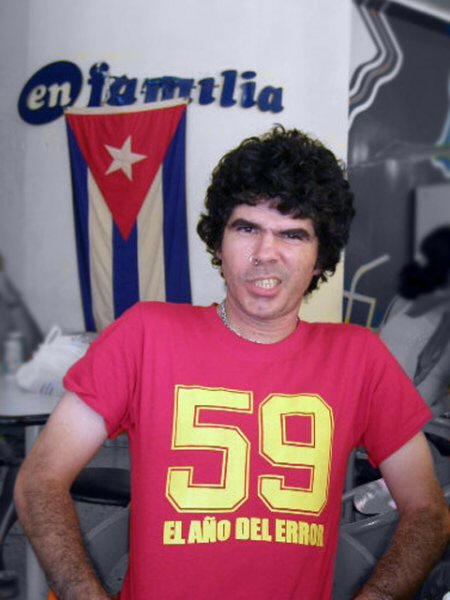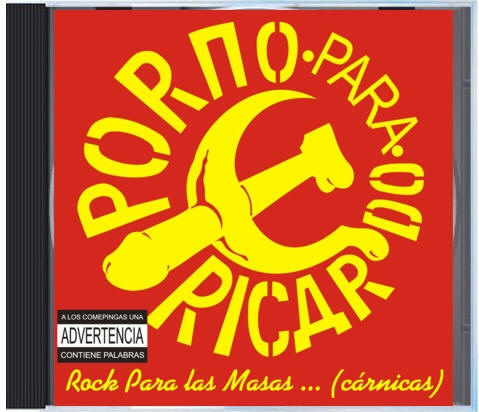
http://www.pornopararicardo.com/fotos/page,view/catid,4/PageNo,1/key,0/hit,1/
NYT profile of Cuban punk-dissident "Gorki
Áquila"
a
necessary comment
by Walter Lippmann
September 6, 2008
Each day we live, we make choices. To get out of bed, or to go back to sleep. Newspaper editors to the same thing, and today we're getting a useful object lesson in journalistic decision- making from the New York Times. It's quite an object lesson. Here we see the choices made under a system which likes to proudly describe itself as having "freedom of the press".
In recent days the island of Cuba, referred to by its literary designation, "the pearl of the Antilles", survived an assault of an all-to-familiar type, Hurricane Gustav. Much power was knocked out, homes destroyed, agricultural lands were damaged.
Not one single life was lost amidst all of the devastation and, an arm of workers and volunteers began to struggle so that the population in the hardest-hit areas was fed, clothed, given a place to sleep, had electric power, and the schools opened on time as quickly as that could be arranged.
When we compare that with what we saw happening in New Orleans after Hurricane Katrina, and after Gustav proceeded to the US and New Orleans after pummeling Cuba, you'd think that a few words of praise might be found for revolutionary Cuba's quick capacity for the restoration of public services to meet their people's individual and social need. You would be wrong, to be under any such misapprehension.
Cuban society is a complex one, with numerous problems and challenges, as any visitor there with any familiarity knows. Under nearly fifty years of unrelenting pressure from the US blockade, and having made some of its own errors as well, the Cuba Revolution still lives, sometimes it seems as by magic.
The NEW YORK TIMES finds all of this of no interest, providing an entirely different focus for its "Saturday Profile" today.
This presumably flattering portrait of a cranky opponent of the Cuban Revolution, filled with quotes, noticeably lacks any kind of dateline. He seems to be what in the United States of America is often referred to as a "shit-disturber", someone out to make trouble by any means: "As a logo for their group, they use a Soviet hammer and sickle transformed into a pornographic image."
By the activities described here, we have an individual and an admiring chorus of foreign admirers, who hope to create some kind of public incident, some trouble, some provocation, some anything.
Based on the quotations from him which are given to readers here, he seems to be quite successful in making a name for himself in the world outside of Cuba. A potty-mouthed individual, had been convicted on a drug charge, who married while in prison to use conjugal visitation rights, he's recently become the darling of a veritable army of Cuba-haters around the world. This can easily fund a career, and you should read this material all the way to the end, as it tells us about the priorities of this newspaper.
Gorki makes an interesting contrast with the last Cuban group of dissidents, the "Ladies in White", those quietly respectable mothers, girlfriends and spouses who used to march single-file to and from a Catholic church on Sundays. The "Ladies in White" have recently split, and now the Cuban dissidence presents its image to the world in this basically nihilistic manner.
In Gorki, Washington and the media stands up to salute. THIS is what they would use demonstrate as a role model for the kind of "freedom" they want to bring to Cuba? Evidently yes it is.
Walter Lippmann
Los Angeles, California
September 6, 2008
THE NEW YORK TIMES
September 6, 2008
The Saturday Profile
From the Cuban Underground,
a Punk Rocker’s Protest Reverberates
By MARC LACEY
http://www.nytimes.com/2008/09/06/world/americas/06gorki.html
SOME people march to protest their government. Gorki Luis Águila Carrasco, the lead singer of a Cuban punk rock group called Porno para Ricardo (“Porn for Ricardo”), vents his discontent by gyrating at a microphone, clutching an electric guitar and spewing out some of the most off-color, ear-splitting lyrics around.
Amid the string of expletives that he bellows in his underground concerts in and around Havana are bold criticisms of Fidel and Raúl Castro, the past and present leaders of the island. So outspoken has he become that the authorities recently charged him with “social dangerousness” and hauled him off to jail.
Turns out, though, he will sing again. After his detention drew international outrage, including a condemnation from the Bush administration, the Cuban authorities dropped the charge, which could have led to four years in prison. Instead they convicted him of public disorder and fined him 600 pesos, or $28 — more than a month’s salary in Cuba.
“I feel even more hate for this tyranny,” Gorki, as he is universally known, said to reporters after he was freed. He then likened his release to walking from a small jail cell into a larger one.
With a mane of curly black hair that is as wild as his persona, Gorki is by no means the only outspoken artist in Cuba. Other rebellious singers and painters, though, are more discreet when it comes to the upper crust of the Cuban leadership. They criticize the system in a way that does not get too personal.
Not so Gorki, who rails against Cuban Communism, scoffs at the revolution and lambastes in no uncertain terms Fidel Castro, who turned 82 last month, and his younger brother, Raúl, 77, the longtime defense minister who took over the presidency in February after Fidel fell ill. And Gorki does all of it in a near scream.
“The Comandante holds elections, which he’s invented to keep power,” he says of Fidel Castro in “El Comandante,” one of his signature songs. “The Comandante wants me to go vote so he can keep [expletive] my life.”
In a shout, he sings: “The Comandante wants me to work and he pays me a miserable salary. The Comandante wants me to applaud after he’s spoken his delirious [expletive]. Don’t eat [expletive], Comandante, for you are a tyrant and no one can stand you.”
Gorki has received backing from more traditional critics of the government, such as Elizardo Sánchez, who leads an unauthorized human rights group that Havana tolerates, and Yoani Sánchez, an outspoken blogger who wrote recently of Gorki, “he sings, sways and shouts in his bloody rock lyrics what others mutter with fear.”
THE Cuban government has remained quiet about Gorki’s recent legal troubles. Some supporters have spoken up, though. Walter Lippmann, an American who runs an e-mail news service that collects material critical of Washington’s embargo on Cuba, recently wrote, “He helps clarify the precise meaning of the word ‘punk’ in the term ‘punk rock.’ ”
Gorki’s recent jail stint was not his first. In 2003 he was convicted on a drug charge and spent nearly two years in custody. He condemns that arrest as a setup by a young woman who pretended to be a fan but really worked for state security. In that case, he emerged from custody even angrier than before.
A self-taught musician and the father of a preteen girl, Gorki, 39, once told an interviewer that he grew up listening to American and English rock, particularly Deep Purple, Led Zeppelin and the Clash. “My dad never liked rock ’n’ roll,” he said, “and since he knew that this type of music brought me problems, he used to advise me to listen to other bands.”
His mother, an outspoken critic of the government, and his older sister left Cuba years ago for Mexico. Gorki married while he was in jail in 2003 so that he and his wife could have conjugal visits. They are separated now but share time with their 12-year-old daughter, Gabriella. “I try to tell her who I am, why I say the things I say,” he said.
A decade ago, he organized Porno para Ricardo — named for a friend who loved pornography but could not get enough of it because of a government ban.
At a recent concert Ricardo himself, a 50-ish man who dresses like a transient, arrived pushing a bicycle and carrying a half-empty bottle of rum. He quickly became the life of the party.
Gorki’s words are not the only rebellious thing about him. He had his nose pierced and often wears a T-shirt that calls 1959, the year of the Cuban revolution, a “year of error.” He was named after Maxim Gorky, the Russian author and founder of literary Socialist Realism.
The band’s raucous rehearsals take place in the small apartment in the Playa neighborhood of Havana that Gorki shares with his 75-year-old father, Luis. The place is devoid of furniture, and the room in the back where the band gathers has egg boxes on the walls to help reduce the noise.
Concerts are held on the sly. Word of the next performance is spread through text messages or whispers. A few months back, it was in a remote location on the outskirts of the capital.
The group arrived at 5 p.m. to warm up. A few hours later nearly 100 people had gathered, most of them young counterculture types who knew the words to song after song.
One of the teenagers in the crowd, who wore a Nirvana T-shirt, identified himself only as Daniel and said he was an aspiring punk rocker himself. Porno para Ricardo is one of the few bands in Cuba that has the guts to tell the truth, he said.
The group played for about two hours, taking one short break to allow a band member, Herbert Domínguez, to vomit off to the side — the result, it appeared, of too much rum.
“I am against everything that limits my personal liberty,” Gorki declared in an interview this year. “The level of unpopularity of the Castro tyranny is so great. It’s obvious. You breathe it. It’s dense. But the people are afraid.”
GORKI does not appear afraid. His recent songs include one called “Dinosaurs,” which refers to the Cuban leadership. Another, “El General,” lambastes Raúl Castro as a farce. After his release from prison, he told a reporter that he was at work on a follow-up to “El Comandante,” the song about Fidel Castro, which will be called “El Comandante II.”
Although Gorki is the front man, his fellow band members — Ciro Díaz Penedo on guitar, Renay Kayrus on drums and Mr. Dominguez on bass — are similarly rebellious. As a logo for their group, they use a Soviet hammer and sickle transformed into a pornographic image.
While Gorki was in jail, Mr. Díaz attended a concert of Pablo Milanés, a noted and far more conventional singer-songwriter, to press for his bandmate’s release. He and some friends unveiled a banner that said “GORKI” and began shouting the singer’s name. A dozen or more men in plain clothes moved in quickly, according to witnesses, pummeled Mr. Díaz and another man and whisked them away to a police station for questioning.
That episode prompted a response from the Bush administration, which has made no secret of its disdain for the Castro brothers.
“We condemn the regime’s violent attack on peaceful concert-goers and arrest of Mr. Águila,” Commerce Secretary Carlos Gutierrez, who left Cuba as a boy with his family in 1960, said of Gorki. Mr. Gutierrez said the authorities’ actions violated the United Nations International Covenant on Civil and Political Rights, which Raúl Castro signed just days after replacing Fidel in February.
Left unsaid by Mr. Gutierrez was whether he had ever listened to Gorki’s music.
===============================================
Some images from Gorki's website. He
says here that
1959, the year of the Cuban revolution's successful
overthrow of the Batista dictatorship, was a mistake.

http://www.pornopararicardo.com/fotos/page,view/catid,4/PageNo,1/key,0/hit,1/
